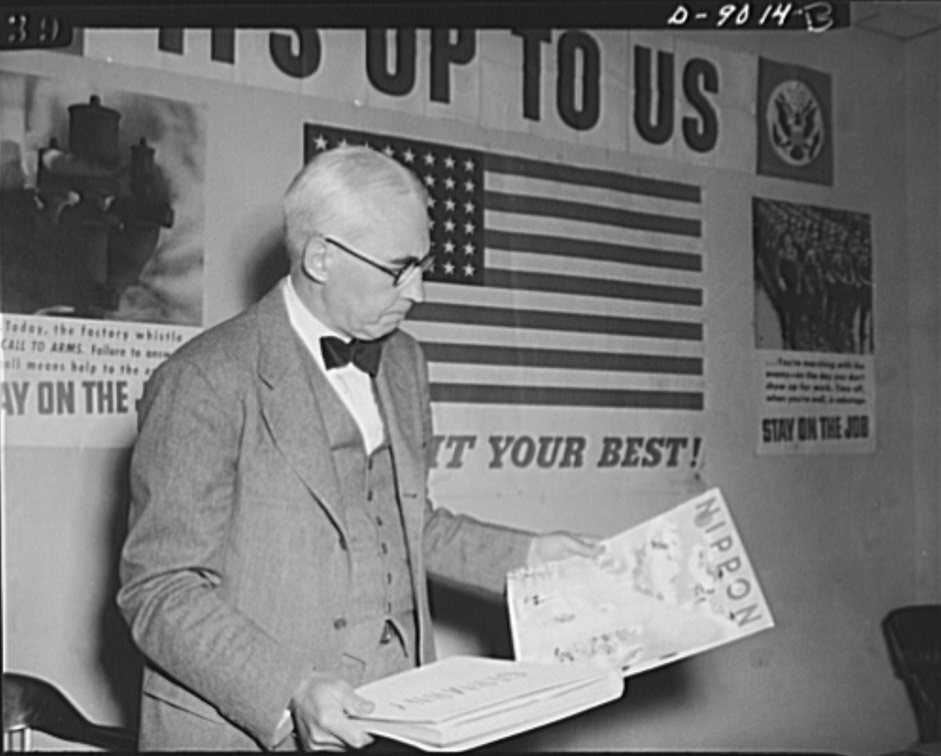|
Manpower (1942 Film)
''Manpower'' was a short propaganda film produced by the US Office of War Information in 1942. Made early shortly after America's entry into World War II, the film addressed the problems associated with the labor market adjusting for war time, such as people with the wrong skills rushing to a town looking for war work, and labor shortages in essential industries. The film discusses how the Roosevelt administration dealt with the problem by the establishment of the Federal Employment Commission, which brought together representatives from labor, management, and the military to organize war production effectively, the test case being in the city of Baltimore. Plot summary In spite of this action, there were labor shortages, and people had to be taken from other occupations and put into war work. Different examples are given and briefly dramatized: * a man who has seniority working in a white collar profession is promised his position back when he returns to work after the war ... [...More Info...] [...Related Items...] OR: [Wikipedia] [Google] [Baidu] |
Office Of War Information
The United States Office of War Information (OWI) was a United States government agency created during World War II. The OWI operated from June 1942 until September 1945. Through radio broadcasts, newspapers, posters, photographs, films and other forms of media, the OWI was the connection between the battlefront and civilian communities. The office also established several overseas branches, which launched a large-scale information and propaganda campaign abroad. From 1942 to 1945, the OWI reviewed film scripts, flagging material which portrayed the United States in a negative light, including anti-war sentiment. History Origins President Franklin D. Roosevelt promulgated the OWI on June 13, 1942, by Executive Order 9182. The Executive order (United States), Executive Order consolidated the functions of the Office of Facts and Figures (OFF, OWI's direct predecessor), the Office of Government Reports, and the Division of Information of the Office for Emergency Management. The Fore ... [...More Info...] [...Related Items...] OR: [Wikipedia] [Google] [Baidu] |
1942 Films
The year of 1942 in film involved some significant events, in particular the release of a film consistently rated as one of the greatest of all time, ''Casablanca''. Top-grossing films (U.S.) The top ten 1942 released films by box office gross in North America are as follows: Events * January 16 – Actress Carole Lombard is killed in a plane crash west of Las Vegas while returning home to Los Angeles from a War Bond tour. * June 4 – British-set wartime romantic drama '' Mrs. Miniver'', starring Greer Garson and Walter Pidgeon, opens at Radio City Music Hall in New York, in what will become a record-breaking 10-week run. The film becomes MGM's highest-grossing film of the 1940s. At the 15th Academy Awards, ''Mrs. Miniver'' wins six awards, including Best Picture, Best Director (for William Wyler), Best Actress (for Greer Garson) and Best Supporting Actress (for Teresa Wright). * August 8 – Walt Disney's animated film ''Bambi'' opens in the United Kingdom. * N ... [...More Info...] [...Related Items...] OR: [Wikipedia] [Google] [Baidu] |
1940s American Films
Year 194 ( CXCIV) was a common year starting on Tuesday of the Julian calendar. At the time, it was known as the Year of the Consulship of Septimius and Septimius (or, less frequently, year 947 ''Ab urbe condita''). The denomination 194 for this year has been used since the early medieval period, when the Anno Domini calendar era became the prevalent method in Europe for naming years. Events By place Roman Empire * Decimus Clodius Septimius Albinus Caesar became a Roman Consul. * Battle of Issus: Septimius Severus marches with his army (12 legions) to Cilicia, and defeats Pescennius Niger, Roman governor of Syria. Pescennius retreats to Antioch, and is executed by Severus' troops. * Septimius Severus besieges Byzantium (194–196); the city walls suffer extensive damage. Asia * Battle of Yan Province: Warlords Cao Cao and Lü Bu fight for control over Yan Province; the battle lasts for over 100 days. * First year of the ''Xingping'' era during the Han Dynasty ... [...More Info...] [...Related Items...] OR: [Wikipedia] [Google] [Baidu] |
American Short Documentary Films
American(s) may refer to: * American, something of, from, or related to the United States of America, commonly known as the "United States" or "America" ** Americans, citizens and nationals of the United States of America ** American ancestry, people who self-identify their ancestry as "American" ** American English, the set of varieties of the English language native to the United States ** Native Americans in the United States, indigenous peoples of the United States * American, something of, from, or related to the Americas, also known as "America" ** Indigenous peoples of the Americas * American (word), for analysis and history of the meanings in various contexts Organizations * American Airlines, U.S.-based airline headquartered in Fort Worth, Texas * American Athletic Conference, an American college athletic conference * American Recordings (record label), a record label that was previously known as Def American * American University, in Washington, D.C. Sports teams S ... [...More Info...] [...Related Items...] OR: [Wikipedia] [Google] [Baidu] |
United States Home Front During World War II
The United States home front during World War II supported the war effort in many ways, including a wide range of volunteer efforts and submitting to government-managed rationing and price controls. There was a general feeling of agreement that the sacrifices were for the national good during the war. The labor market changed radically. Peacetime conflicts concerning race and labor took on a special dimension because of the pressure for national unity. The Hollywood film industry was important for propaganda. Every aspect of life from politics to personal savings changed when put on a wartime footing. This was achieved by tens of millions of workers moving from low to high productivity jobs in industrial centers. Millions of students, retirees, housewives, and unemployed moved into the active labor force. The hours they had to work increased dramatically as the time for leisure activities declined sharply. Gasoline, meat, clothing, and footwear were tightly rationed. Most fami ... [...More Info...] [...Related Items...] OR: [Wikipedia] [Google] [Baidu] |
Paul McNutt
Paul Vories McNutt (July 19, 1891 – March 24, 1955) was an American diplomat and politician who served as the 34th governor of Indiana, high commissioner to the Philippines, administrator of the Federal Security Agency, chairman of the War Manpower Commission and ambassador to the Philippines. Background Paul Vories McNutt was born in Franklin, Indiana, on July 19, 1891, the only child of John C. and Ruth McNutt. Both his parents were school teachers when they met, but his father began practicing law just before he was born. The family moved to Indianapolis in 1893 where his father had become librarian of the Indiana Supreme Court. McNutt was enrolled in public school in the city and attended for two years. In 1898 his father resigned his position and they moved again to Martinsville where he opened a law office. McNutt was moved to a local school where he attended until graduation. In 1909, McNutt entered Indiana University where he was active in campus politics, ... [...More Info...] [...Related Items...] OR: [Wikipedia] [Google] [Baidu] |
List Of Allied Propaganda Films Of World War II
During World War II and immediately after it, in addition to the many private films created to help the war effort, many Allied countries had governmental or semi-governmental agencies commission propaganda and training films for home and foreign consumption. Animated films are not included here. British Empire and Commonwealth United Kingdom 1939 1940 1941 1942 1943 1944 1945 Australia In Australia the Australian News and Information Bureau, under the Department of Information, produced the following Canada In Canada, the National Film Board of Canada either distributed or produced the following as part of its '' Canada Carries On'' and '' The World in Action'' series. 1940 1941 1942 1943 1944 1945 India United States The United States had the largest film industry of any of the Allied powers, and its use for propaganda purposes is legendary. Because it was so big, there was no single governmental or semi-governmental agency that centrally contro ... [...More Info...] [...Related Items...] OR: [Wikipedia] [Google] [Baidu] |
Paul V
Pope Paul V (; ) (17 September 1552 – 28 January 1621), born Camillo Borghese, was head of the Catholic Church and ruler of the Papal States from 16 May 1605 to his death, in January 1621. In 1611, he honored Galileo Galilei as a member of the papal Accademia dei Lincei and supported his discoveries. In 1616, Pope Paul V instructed Cardinal Robert Bellarmine to inform Galileo that the Copernican theory could not be taught as fact, but Bellarmine's certificate allowed Galileo to continue his studies in search for evidence and use the geocentric model as a theoretical device. That same year Paul V assured Galileo that he was safe from persecution so long as he, the Pope, should live. Bellarmine's certificate was used by Galileo for his defense at the Galileo affair, trial of 1633. Trained in jurisprudence, Borghese was made Cardinal-Priest of Sant'Eusebio and the Cardinal Vicar of Rome by Pope Clement VIII. He was elected as Pope in 1605, following the death of Pope Leo ... [...More Info...] [...Related Items...] OR: [Wikipedia] [Google] [Baidu] |


